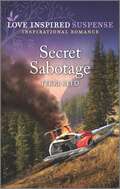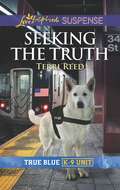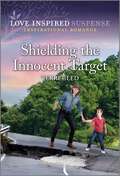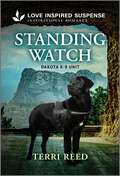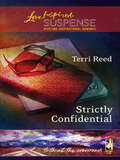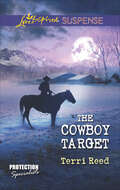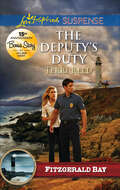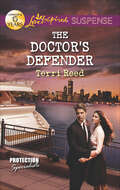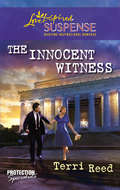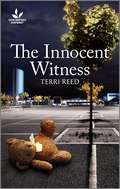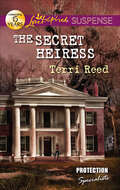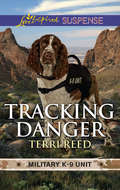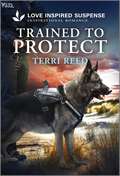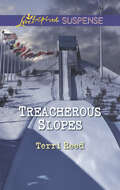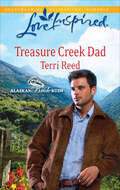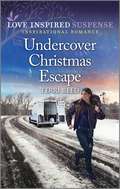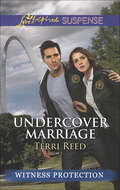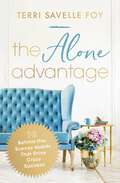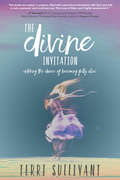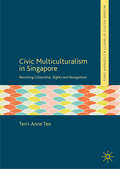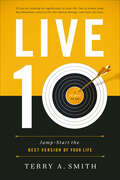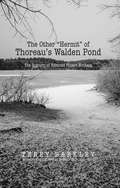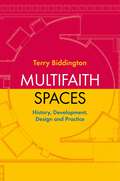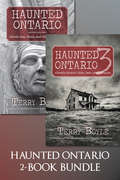- Table View
- List View
Secret Sabotage
by Terri ReedThe crash was intentional… But he can&’t remember why. With no memory of the crash that landed him in a hospital, Ian Delaney is determined to uncover who sabotaged his helicopter—without the protection of his family-appointed bodyguard. But Simone Walker&’s used to stubborn clients and won&’t let Ian leave her sight. To catch an unknown traitor, they must rely on each other…or the next attack could prove lethal.From Love Inspired Suspense: Courage. Danger. Faith.
Seeking the Truth: Faith in the Face of Crime (True Blue K-9 Unit #6)
by Terri ReedHer investigation could prove fatal…In this exciting True Blue K-9 Unit installmentBy secretly investigating the New York City K-9 Command Unit chief’s murder, reporter Rachelle Clark puts a bull’s-eye on her back. Single dad and K-9 unit officer Carter Jameson thought Rachelle was reporting on police-field-dog trials—not his brother’s death. Though he’s not happy about her true purpose, the danger is real…and he and his trusty German shepherd must save her.
Shielding the Innocent Target
by Terri ReedA child under his protection… and a hit man in pursuit. After witnessing her boss&’s murder, Paige Walsh must trust Deputy US Marshal Lucas Cavendish to bring her to safety. But when a notorious assassin targets her and her son, Lucas&’s short-term assignment turns into a dangerous cross-country mission. For Paige to identify her boss&’s killer, Lucas must get the family into witness protection. Except the hit man knows their every move…and trusting the wrong person could get them killed.From Love Inspired Suspense: Courage. Danger. Faith.
Standing Watch (Dakota K-9 Unit)
by Terri ReedTo protect an innocent witness… a K-9 must sniff out a killer. When K-9 task force officer Zach Kelsey&’s estranged wife is attacked at a Mount Rushmore observation deck, he and his K-9, Amber, are quick to come to her rescue. He discovers not only that Eden, a park ranger, is carrying his child, but that she saw her coworker&’s murder. As the only witness to the crime, Eden has no choice but to accept Zach&’s protection. But with a ruthless killer ramping up his vicious attacks, they must put their differences aside to catch the murderer…before Eden becomes his next target.From Love Inspired Suspense: Courage. Danger. Faith.Dakota K-9 Unit Book 1: Chasing a Kidnapper by Laura ScottBook 2: Deadly Badlands Pursuit by Sharee StoverBook 3: Standing Watch by Terri ReedBook 4: Cold Case Peril by Maggie K. BlackBook 5: Tracing Killer Evidence by Jodie Bailey
Strictly Confidential (Faith at the Crossroads #5)
by Terri ReedA Colorado reporter’s curiosity over a mysterious Italian could lead her into danger in this inspirational romantic suspense mystery.From the desk of Colleen Montgomery:Alessandro Donato—there’s more to Lidia Vance’s nephew than meets the eye.—Says he’s an accountant for the European Union (but spends a lot of time here in Colorado Springs).—Pops up whenever anything bad happens . . . and then mysteriously disappears. Wonder if he knows anything about the troubles plaguing the Vance and Montgomery families, and/or if it’s connected to the dismantled drug cartel?I’ll have to stick close to the handsome Italian to find out what secrets he’s keeping. It’ll be tough, but this reporter is willing to do whatever it takes to uncover the truth.
The Cowboy Target (Protection Specialists #4)
by Terri ReedWhen a widowed rancher is accused of murder, a female bodyguard is determined to protect him and his daughter in this heartwarming romantic suspense novel.Ever since the suspicious death of his wife, Wyoming rancher and single dad Wyatt Monroe has shut the world out. But now he stands accused of murder. With a dead ranch hand on his doorstep, Wyatt has only one hope—a blue-eyed, blonde bodyguard. But it’ll take more than skill for work-obsessed Jackie Blain to save her reluctant client, who just wants to be left alone.Jackie is determined to gain Wyatt’s trust by keeping him and his daughter safe. With their lives in her hands, Jackie is faced with her toughest assignment ever—saving the cowboy and guarding her heart.
The Deputy's Duty (Fitzgerald Bay)
by Terri ReedDangerous small-town secrets are uncovered in the finale of the New York Times–bestselling author’s inspirational romantic suspense series.As the eldest of six siblings, Ryan Fitzgerald has always been a protector. And as deputy chief of the Fitzgerald Bay police department, those instincts have been very valuable. But staying in control has always meant keeping his distance . . . until journalist Meghan Henry comes to town.Seeking justice for her murdered cousin, and safety for a missing, orphaned child, Meghan is not afraid to face danger head-on. So when she uncovers a dark Fitzgerald secret, Ryan is left with a devastating choice. Which will he protect—his family, or the woman he’s come to love?This eBook edition of The Deputy’s Duty includes the Love Inspired Historical bonus story An Enduring Love, by Jillian Hart.
The Doctor's Defender (Protection Specialists)
by Terri ReedWhen a surgeon is targeted by a mysterious killer, she finds herself getting dangerously close to her bodyguard in this uplifting romantic suspense novel.As a trauma surgeon, Dr. Brenda Storm saves lives every day. But now someone wants her dead. The threats to her life begin with an anonymous delivery of poisoned cupcakes. With no idea of what might come next, the hospital has hired a bodyguard to protect her 24/7.At first, Brenda doesn’t think too-handsome Kyle Martin is right for the job. Then she discovers his harrowing background—and that Kyle will do anything to keep her safe. With every attempt on her life, she’s more drawn to the strong and silent man who risks his life for hers. But their growing feelings could put them both in harm’s way.
The Innocent Witness
by Terri ReedFaith sustained Vivian Grant through her horrible childhood and loveless marriage, but how much more can she take? Her husband has been killed. Her autistic son is the only witness. And someone is twisting the evidence to place the blame on her. Viv has no one to trust-and danger is closing in. A failed protection detail cost former Secret Service agent Anthony Carlucci his job-and his self-conï ¬ dence. He's not going to fail anyone under his care again. Anthony will risk anything to keep Viv and her son safe...including his heart.
The Innocent Witness (Protection Specialists)
by Terri ReedRevisit this classic thriller from bestselling author Terri Reed (2011)Faith sustained Vivian Grant through her horrible childhood and loveless marriage, but how much more can she take? Her husband has been killed. Her autistic son is the only witness. And someone is twisting the evidence to place the blame on her. Viv has no one to trust—and danger is closing in.A failed protection detail cost former Secret Service agent Anthony Carlucci his job—and his self-confidence. He's not going to fail anyone under his care again. Anthony will risk anything to keep Viv and her son safe…including his heart.Previously Published
The Secret Heiress (Protection Specialists)
by Terri ReedIn this inspirational romantic suspense, a bodyguard proposes a pretend engagement to protect a new heiress from her dangerous family.Finding out she is heir to a fortune shocks Caroline Tully to her core. And to “qualify” for the inheritance, she just has to visit her newfound grandfather’s Mississippi home from Christmas to New Year’s. Adopted as a baby, Caroline knows nothing about her mother’s family . . . and doesn’t realize they can’t be trusted. When attempts are made on her life, there’s only one man who can protect her. Donovan Cavanaugh—a man who made her lonely heart want to love again. Posing as her fiancé, Don promises to find the would-be killer. But will his protection—and his love—be enough to keep her safe?
Tracking Danger (Military K-9 Unit)
by Terri ReedOn the hunt for a killerAn exciting prequel to the Military K-9 Unit seriesSheriff’s Deputy Serena Evans knows her trusty K-9 partner Ginger can track down the serial killer who is tormenting her Texas town…if only her boss would give her the chance. When they trace him to Jason Hargrove’s land, Serena and Ginger will have to team up with the reclusive rancher in order get their man.
Trained to Protect
by Terri ReedProtecting a witness could be a deadly mission for this K-9 team. K-9 officer Tarren McGregor never imagined that a cartel would find its way to Texas&’s South Padre Island—or target his best friend&’s sister. But when Julia Hamilton witnesses and prevents the kidnapping of a teen girl, Tarren knows that trouble is soon to follow. Because Julia didn&’t just protect the girl—she saw the abductor&’s face. Now she&’s marked for murder, and it&’s up to Tarren and his K-9 partner to keep Julia safe from the human traffickers in pursuit…even if it means putting themselves in the line of fire.From Love Inspired Suspense: Courage. Danger. Faith.
Treacherous Slopes
by Terri ReedKILLER COMPETITION A champion ski jumper, Nick Walsh wants one thing: to win the gold for his late brother. Nick has always blamed himself for his family's tragic loss-and so does everyone else. To complicate things, sweet and shy reporter Julie Frost insists on doing a story about him. But as Nick gets closer to achieving his dream, someone will do anything to stop him. Somehow, Nick must keep Julie from getting too close as they confront a threat that can destroy them both. Julie and Nick are on the verge of discovering the truth about his brother's death...unless an unknown murderer finds them first.
Treasure Creek Dad (Alaskan Bride Rush #2)
by Terri ReedSingle father Jake Rodgers's daughter isn't happy about moving to tiny Treasure Creek, Alaska. So the former big-city businessman trades his suits for hiking boots and he books a father-daughter wilderness tour to acclimate her. But Veronica isn't buying it. Perhaps guide Casey Donner is just the person to help the girl appreciate the Klondike state's natural beauty. But could tomboy Casey, in her ponytail and cargo pants, also be what this city boy needs for a lifetime of love?
Undercover Christmas Escape
by Terri ReedAn undercover mission has deadly consequences The assignment was simple: infiltrate an office Christmas party, gather evidence and take down a drug cartel. However, DEA agent Duncan O&’Brien and deputy US marshal Sera Morales encounter more than they were expecting when masked thieves crash their undercover operation and abduct Sera, who narrowly escapes. Can Duncan and Sera work together, despite their competitiveness and hidden attraction, to capture a merciless drug lord—before this Christmas becomes their last?From Love Inspired Suspense: Courage. Danger. Faith.
Undercover Marriage (Witness Protection)
by Terri ReedLaw enforcement agents pose as husband and wife to break a child trafficking ring in this inspirational romantic suspense.An illegal adoption ring—using kidnapped babies—has to be stopped. To gather the necessary evidence, US marshal Serena Summers goes undercover—as a married woman desperate for a baby. Her “husband” is her own partner, US marshal Josh McCall, whom Serena blames for her brother’s death. How can she act like a loving wife when she has to constantly fight her feelings for a man she isn’t sure she can trust? The closer they get to unraveling the dark web of deceit, though, the more being Josh’s undercover wife means putting her life—and future—in his hands.
The Alone Advantage: 10 Behind-the-Scenes Habits That Drive Crazy Success
by Terri Savelle FoyMaster Your Minutes in Private and You&’ll Master Your Life in PublicIn The Alone Advantage, Terri Savelle Foy shows how simple habits behind closed doors can reshape every aspect of your life.She knows what it&’s like to be in a rut, repeating the same routine with no significant progress toward deep-down dreams. Terri started noticing that although the average person does not spend time alone—the average successful person does.Whatever your unique, God-given dream is, Terri reveals what successful people do in private to prepare and achieve the dreams in their heart. Discoverthe morning routine that can change your life before breakfast,how to harness your imagination to visualize the future you want, andwhy successful people spend time alone.Step-by-step, Terri shows you how realizing your biggest dream starts with a daily to-do list. As you learn the habits of successful people—everything from waking up to cleaning up to growing up—you will become your own best cheerleader. The Alone Advantage equips you to wake up with vision, have a clear set of goals, and protect your time in private so God can promote you in public.
The Divine Invitation: Entering the Dance of Becoming Fully Alive
by Terri SullivantAre you ready to enter the dance of becoming fully alive?Have you ever wondered, if we have the God of heaven and earth living inside us, why aren&’t we experiencing more in life? Why aren&’t we seeing more transformation in ourselves, or in others for that matter? What does it look like to have &“Jesus in me&” anyway, as an individual and also as a woman? These are the questions life coach and pastor Terri Sullivant was asking herself when God answered her in a profound, life-changing way.The Divine Invitation provides a pathway to find what your heart deeply longs for in every area of life. It&’s a metaphor showing the way for every woman to enter the dance of becoming fully alive. Learning this dance is about developing a relationship with Jesus, like two people dancing skillfully and gracefully. It&’s about becoming so entwined with the thoughts, words, emotions, and behaviors of Jesus that the two of you are one. You find that this deep connection transcends all of life, enabling you to live joyfully and freely, come what may.
Civic Multiculturalism in Singapore: Revisiting Citizenship, Rights and Recognition (Palgrave Politics of Identity and Citizenship Series)
by Terri-Anne TeoThis book is about multiculturalism, broadly defined as the recognition, respect and accommodation of cultural differences. Teo proposes a framework of multicultural denizenship that includes group-specific rights and intercultural dialogue, by problematising three issues: a) the unacknowledged misrecognition of non-citizens within the scholarship of multiculturalism; b) uncritical treatment of citizens and non-citizens as binary categories and; c) problematic parcelling of group-specific rights with citizenship rights. Drawing on the case of Singapore as an illustrative example, where temporary labour migrants are culturally stereotyped, socioeconomically disenfranchised and denied access to rights accorded only to citizens, Teo argues that understandings of multiculturalism need to be expanded and adjusted to include a fluidity of identities, spectrum of rights and shared experiences of marginalisation among citizens and non-citizens. Civic Multiculturalism in Singapore will be of interest to students and scholars of multiculturalism, critical citizenship studies, migration studies, political theory and postcolonial studies.
Live 10: Jump-Start the Best Version of Your Life
by Terry A. SmithListen. Listen carefully. Listen with your heart. Hear God calling to you. He wants your God-inspired dreams to come true. He wants you to help make His world all He knows it can be. He is for you. Cheering for you. And if God is for us, how can we do anything but believe that our best possible future is within our grasp?Pastor and leadership expert Terry A. Smith has seen the transformation. From fear-based hesitation to faith-based confidence. From conventional, not-quite-fulfilling life to proactive, best, abundant life. It is possible for you. But Smith is not asking you to take his word for it. From the Old Testament to Jesus, from Augustine to John Calvin to Eugene Peterson, from Peter Drucker to Seth Godin, Smith has assembled a dazzling host of stories and ideas to support his proposition: We are each called to reach our full potential, to marshal all our resources and step out in faith. We can Live Ten, and it will not just change us; it will change the world.
The Other “Hermit” of Thoreau’s Walden Pond: The Sojourn of Edmond Stuart Hotham
by Terry Barkley“I didn’t realize there was another ‘hermit’ of Walden Pond!” is the usual response author-historian Terry Barkley receives when he tells someone the subject of his new book. Henry David Thoreau’s experiment there from 1845-1847 is widely known and immortalized in his classic Walden; or, Life in the Woods (1854). However, stresses Barkley, “Neither the world nor even most avid Thoreauvians know about Edmond Hotham’s six-months at Walden Pond during the winter of 1868-1869,” the fascinating story of which is detailed in The Other “Hermit” of Thoreau’s Walden Pond: The Sojourn of Edmond Stuart Hotham. A generation later and nearly seven years after Henry Thoreau died in 1862 of tuberculosis in Concord, Massachusetts, a young theological student from New York City arrived in Concord in November 1868. Edmond Hotham had never been there, but he immediately began preparations to pursue the “wild life.” He met transcendentalist poet (William) Ellery Channing, a former close friend of Thoreau’s who had suggested to Thoreau that he build his cabin at Walden Pond. It was Channing who likely introduced Hotham to transcendentalist leader Ralph Waldo Emerson (the “Sage of Concord”), and Emerson who gave Hotham permission, like Thoreau before him, to build his “Earth-cabin” on the poet’s property at Walden Pond. Edmond Hotham’s sojourn at Walden Pond was the first and only time someone traveled to Walden Pond to emulate Thoreau’s experiment in simplicity. Hotham made his way to Walden Pond to pursue some “private business” while he was preparing for Christian ministry and stateside missionary work. He built his shanty on the pond’s shore about 100 yards in front of Thoreau’s, where he attempted to out-economize and out-simplify Thoreau. Hotham’s sojourn as the second “hermit” at Walden Pond exemplified the growing adulation of Henry David Thoreau and his literary work. Author Terry Barkley has gleaned archival sources, vital records, period newspaper accounts, and census rolls for everything that is known about Edmond Hotham. The Other “Hermit” of Thoreau’s Walden Pond is the first book-length treatise on Hotham, half of which is wholly new material. It far supersedes the late Kenneth Walter Cameron’s 1962 article on Hotham, which until now was the most complete study of the man. Barkley’s groundbreaking study book is an important addition to the Concord-Walden Pond story and a fascinating read. To quote Thoreau, “What is once well done is done forever.”
In Everything Give Thanks
by Terry BarnesMatt enjoys being with friends and running cross-country. His father's sudden death turns his world upside down. He wants to be left alone. But, Wade, a stuttering, handicapped young man, moves in next door and insists on making Matt his best friend.
Multifaith Spaces: History, Development, Design and Practice
by Terry BiddingtonIn multifaith space, different religious world views come together in a way that mirrors the multicultural life experience of people living in towns and cities across the world. These spaces can highlight complex and sensitive issues to do with political and social tensions around the emergence of increasingly densely urbanised populations. At the same time, they also hold out the possibility of encouraging or promoting neighbourliness, dialogue, hospitality and shared activity for the betterment of the community.This book explores the history, development, design and practicalities of multifaith spaces. From early shared religious buildings that had to cater for the spiritual rituals of two or more faiths, to the shared multifaith spaces of modern secular locations such as universities, airports and hospitals, author Terry Biddington looks at the architectural, theological, social, legal and practical complexities that arise from the development and use of such spaces. The book also draws together research to enable further development of multifaith spaces.
Haunted Ontario 2-Book Bundle: Haunted Ontario / Haunted Ontario 3
by Terry BoyleGhost hunter Terry Boyle brings you this two-ebook bundle of the bestselling Haunted Ontario books, conjuring up an eerie treasury of paranormal locales. Join Terry as he investigates apparitions at the former Swastika Hotel in Muskoka, poltergeists in Toronto’s Royal Ontario Museum, and a whole village of spooks roaming the buildings of Black Creek Pioneer Village. With a list of addresses, phone numbers, and websites for each location, Terry Boyle invites all ghost enthusiasts along for the adventure. Feeling brave? You might just want to stop and visit some ghosts on your next trip.
